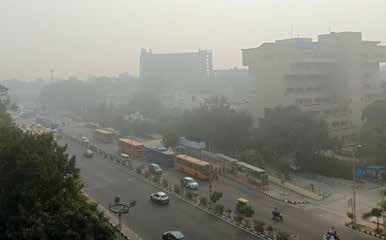
SOURCE: Delhi has many leading sources of air pollution like traffic, construction, pollution which is coming into the city from beyond the administrative boundaries, open waste running
Environment Minister Gopal Rai convened an urgent meeting on Monday to assess the implementation of pollution control measures as Delhi woke up to a shroud of smoke amidst rapidly worsening air quality.
Monitoring agencies reported Delhi’s air quality becoming “very poor” on Sunday, a status not seen since May 17 due to adverse meteorological conditions. The city’s 24-hour average Air Quality Index (AQI) rose from 248 on Saturday to 313 on Sunday, a significant deterioration from the AQI of 336 recorded on May 17.
The Central Pollution Control Board (CPCB) reported AQI levels of 322 in Faridabad, 246 in Ghaziabad, 354 in Greater Noida, 255 in Gurugram, and 304 in Noida on Sunday.
The meeting led by Minister Rai will focus on the effective implementation of measures to mitigate the situation, with discussions involving relevant departments.
Officials from the India Meteorological Department indicated that Delhi-NCR’s air quality is expected to remain “very poor” in the coming days due to decreasing temperatures and emissions from stubble burning. Slow wind speed and minimal rainfall in October, unlike the previous two years, were also noted.
The central government’s Decision Support System for Air Quality Management predicted an increase in paddy straw burning starting Monday. Smoke from this source contributed to 16% of Delhi’s PM2.5 pollution on Sunday, a figure expected to rise to 30-32% on Monday.
The Union environment ministry reported that farm fires accounted for 34% of Delhi’s PM2.5 pollution on November 3 last year and 48% on November 7, 2021.
The Commission for Air Quality Management (CAQM), responsible for implementing the Graded Response Action Plan (GRAP), directed NCR authorities to raise parking fees, promote CNG or electric buses, and increase metro train services to discourage private transport amid the anticipated rise in pollution levels. GRAP categorizes actions into four stages: Stage I (AQI 201-300), Stage II (AQI 301-400), Stage III (AQI 401-450), and Stage IV (AQI >450).
Under Stage I, private construction and demolition projects over 500 square meters without state government portal registration for dust mitigation measures are suspended. Coal and firewood use in ‘tandoors’ at eateries are banned, and polluting industrial units and thermal power plants within 300 km of Delhi face punitive measures.
Stage II involves higher parking fees to deter private vehicles and improved CNG or electric bus and metro services with additional fleets and increased frequency. Stage III prohibits BS-III petrol and BS-IV diesel four-wheelers in Delhi and nearby areas.
It also halts construction and demolition work, except for essential government projects, along with mining and stone crushing activities. Additionally, it bans entry of light commercial vehicles registered outside Delhi and diesel-heavy trucks, except for essential services.
Stage IV bans all construction and demolition work. State governments have the authority to decide on online classes for students and work-from-home arrangements for government and private offices during such situations.(With inputs from PTI)
Police rescue three-year-old from kidnapper in Ashok Vihar; factory worker arrested
Doctors say early diagnosis, IVF and specialised high-risk care helped ensure a safe delivery despite…
Police arrest a 19-year-old and four juveniles for allegedly stabbing a 25-year-old in retaliation for…
Batting coach Sitanshu Kotak backs struggling opener Abhishek Sharma and No.3 Tilak Varma, saying there…
Delhi High Court grants bail to man accused after former partner’s suicide, says mere breakup…
Heroin worth Rs 6 crore seized in Dilshad Garden; 23-year-old peddler with alleged family links…